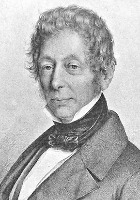Johannes Carsten Hauch
Johannes Carsten Hauch Poems
Det er paa Tiden, bort jeg vandre maa,
Den blege Død har lammet mine Kræfter,
Det dunkle Eventyr jeg skal bestaae,
...
When they thought that Denmark's king
Soundly in the graveyard slumbered,
Words incredible, unnumbered,
Through the land crept whispering.
...
WHEN happiness turns from you,
And all seems unrepaid,
And you are scorned by enemies,
Even by friends betrayed;
...
Oh you who weep, brush all your tears aside!
And you who mourn, recall grief won’t abide!
For you’ll know rest when your heart beats no more,
...
I remember a far place, where I would gladly be;
There, hours glided slowly, silently,
As clear as silver pearls, strung on a golden wire,
...
We are the nightly weavers
who gather the invisible threads
from the Milky Way's outmost ring
where the end of the loom stands.
...
Johannes Carsten Hauch Biography
Johannes Carsten Hauch (May 12, 1790 - March 4, 1872), Danish poet, was born of Danish parents residing at Frederikshald in Norway. In 1802 he lost his mother, and in 1803 returned with his father to Denmark. In 1807 he fought as a volunteer against the English invasion. He entered the university of Copenhagen in 1808, and in 1821 took his doctors degree. He became the friend and associate of Steffens and Oehlenschläger, warmly adopting the romantic views about poetry and philosophy. His first two dramatic poems, The Journey to Ginistan and The Power of Fancy, appeared in 1816, and were followed by a lyrical drama, Rosaurn (1817); but these works attracted little or no attention. Hauch therefore gave up all hope of fame as a poet, and resigned himself entirely to the study of science. He took his doctors degree in zoology in 1821, and went abroad to pursue his studies. At Nice he had an accident which obliged him to submit to the amputation of one foot. He returned to literature, publishing a dramatized fairy tale, the Hamadryad, and the tragedies of Bajazet, Tiberius, Gregory VII, in 1828-1829, The Death of Charles V (1831), and The Siege of Maestricht (1832). These plays were violently attacked and enjoyed no success. Hauch then turned to novel-writing, and published in succession five romances Vilhelm Zabern (1834); The Alchemist (1836); A Polish Family (1839); The isle on the Rhine (1845); and Robert Fulton (1853). In 1842 he collected his shorter Poems. In 1846 he was appointed professor of Scandinavian languages in Kiel, but returned to Copenhagen when war broke out in 1848. About this time his dramatic talent was at its height, and he produced one admirable tragedy after another; among these may be mentioned Svend Grathe (1841); The Sisters at Kinnekullen (1849); Marshal Sag (1850); Honour Lost and Won (1851) and Tycho Brahe's Youth (1852). From 1858 to 1860 Hauch was director of the Danish National Theatre; he produced three more tragedies: The King's Favourite (1859); Henry of Navarre (1863); and Julian the Apostate (1866). In 1861 he published another collection of Lyrical Poems and Romances and ~fl 1862 the historical epic of Valdemar Seir, volumes which contain his best work. From 1851, when he succeeded Oehlenschläger, to his death, he held the honorary post of professor of aesthetics at the university of Copenhagen. He died in Rome in 1872, and was buried at the Cimitero acattolico. Hauch was one of the most prolific of the Danish poets, though his writings are unequal in value. His lyrics and romances in verse are always line in form and often strongly imaginative. In all his writings, but especially in his tragedies, he displays a strong bias in favor of what is mystical and supernatural. Of his dramas Marshal Stig is perhaps the best, and of his novels the patriotic tale of Vilhelm Zabern is admired the most. See Georg Brandes, Carsten Hauch (1873) in Danske Digtere (1877); F Rønning, J. C. Hauch (1890), and in Dansk Biografisk-Lexicon, (vol. vii. Copenhagen, 1893). Hauch's novels were collected (1873–1874) and his dramatic works (3 vols., 2nd ed., 1852–1859).)
The Best Poem Of Johannes Carsten Hauch
Afsked Fra Verden
Det er paa Tiden, bort jeg vandre maa,
Den blege Død har lammet mine Kræfter,
Det dunkle Eventyr jeg skal bestaae,
Som Sjælen frygter og dog længes efter.
5 Hvad meest jeg elsked, fandt i Graven Skjul,
Og ingen Ungdomsven jeg har tilbage,
Jeg stod i Verden som en fremmed Fugl,
Hvis Sang kun var et Suk fra svundne Dage.
Hvad jeg har virket, har jeg fast forglemt,
Det spredtes rundt som Løv for kolde Vinde,
Kun Eet jeg veed, det har mit Hjerte gjemt,
Min Barndoms Tro, den gik mig ei af Minde.
Og jeg har forsket rundt i mangen Bog,
Og jeg har siddet ved de Viises Side,
Trods deres Ord dog blev jeg lige klog
Paa det, som allerhelst jeg vilde vide.
Thi Jordens Kløgt ei give kan Besked
Om hvad der skimtes gjennem Gravens Rifter,
Og hvad enfoldig Fromhed her ei veed,
Det sees ei heller i de Vises Skrifter.
Dog var der Een, hvis Øie længer saae,
Hvis Ord skal staae, naar Jordens Kløgt forsvinder,
»Hvo ikke bli'er som en af disse Smaa,«
Saa talte han, »ei Himlens Veie finder.«
Du Frelsens Aand, forlad da Du mig ei!
Og tag den Kundskab bort, der mig forvilder!
Udslet min Synd og led Du mig paa Vei,
Igjennem Dødens Nat til Livets Kilder!
